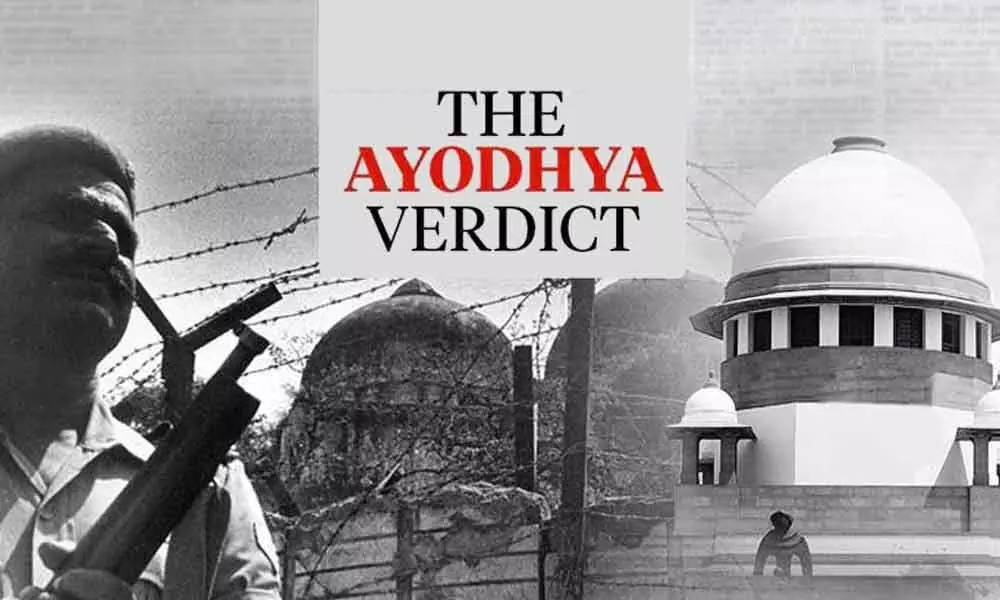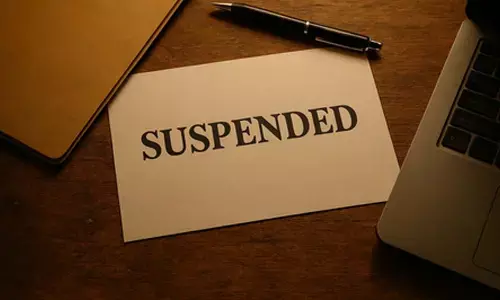Ishwar Allah Tere Naam : The Ayodhya Verdict

Settling a fractious issue that goes back more than a century, the Supreme Court in a historic verdict on Saturday backed the construction of a Ram temple by a trust at the disputed site in Ayodhya, and ruled that an alternative five-acre plot must be found for a mosque in the Hindu holy town
New Delhi: Settling a fractious issue that goes back more than a century, the Supreme Court in a historic verdict on Saturday backed the construction of a Ram temple by a trust at the disputed site in Ayodhya, and ruled that an alternative five-acre plot must be found for a mosque in the Hindu holy town.
Delivering a unanimous judgement on a case that has long polarised the country and frayed the secular tapestry of Indian society, a five-judge bench of the apex court headed by Chief Justice of India Ranjan Gogoi said the faith of Hindus that Lord Ram was born at the site was undisputed, and he is symbolically the owner of the land.
Yet, it is also clear that the destruction of the 16th century three-domed structure by Hindu kar sevaks, who want to build a Ram temple there, was a wrong that "must be remedied," the ruling said.
The judgement was widely welcomed by Hindu politicians and groups, while the Muslim leadership said they will accept the verdict, even though they described it as flawed.
Still, they called for peace and calm, and leaders across the political spectrum noted that it was now time to move on. "Whether it is devotion to Ram or Rahim, now is time for everybody to strengthen devotion to India," Prime Minister Narendra Modi said in a tweet.
The dispute over the site of Babri Masjid, a three-domed mosque built by or at the behest of Moghul emperor Babur, dates back centuries with Hindus contending that the invading Muslim armies had razed an existing Ram temple to erect the mosque.
However, it turned into a legal dispute in 1885 when a mahant went to court seeking permission to build a canopy outside the mosque. The plea was dismissed. In December 1949, unidentified miscreants spirited an idol of Lord Ram into the mosque.
The structure was destroyed by a large mob of kar sevaks on December 6, 1992.
The demolition triggered nationwide Hindu-Muslim riots, more so in north India and Mumbai, which left many hundreds dead. Subsequently, Muslim extremists angered by the demolition and the riots, carried out a series of bombings in Mumbai on March 12, 1993, which left hundreds dead.
"The Constitution must ensure that a wrong committed must be remedied. Justice would not prevail if the Court were to overlook the entitlement of the Muslims who have been deprived of the structure of the mosque through means which should not have been employed in a secular nation committed to the rule of law," the judgement said.
To remedy that wrong, the court asked the government to allot a five-acre plot in a "prominent" location in the holy town of Ayodhya in Uttar Pradesh for constructing a new mosque.
The disputed 2.77-acre plot will for now remain with a Central government receiver, who will hand it over to a government-created trust that must be created within three months.
The trust will be tasked with the construction of the temple. The judgement said it is not concerned with faith and belief, and instead treated the case as a title dispute over land between three parties -- the Sunni Muslim Waqf Board, the Nirmohi Akhara, a Hindu group, and the symbolic Lord Rama designated as Ram Lalla Virajman.
"The dispute is over immovable property. The court does not decide title on the basis of faith or belief but on the basis of evidence," the judgement said, delivered at the end of a marathon 40-day hearing-- the second longest in the history of apex court.
Justice Gogoi is due to retire on November 17. "On the balance of probabilities, there is clear evidence to indicate that the worship by the Hindus in the outer courtyard" has continued unimpeded even before 1857 when the British annexed Oudh region.
"The Muslims have offered no evidence to indicate that they were in exclusive possession" of the mosque before 1857, it said. "The faith of the Hindus that Lord Ram was born at the demolished structure is undisputed," it added.
The verdict in the politically-sensitive Ram Janmabhoomi-Babri Masjid land dispute case, one of the most important and most anticipated judgements in India's history, runs into 1,045-page pages. The apex court bench also comprised Justices S A Bobde, D Y Chandrachud, Ashok Bhushan and S Abdul Nazeer.
As security was tightened at communally sensitive places across the country, Mohan Bhagwat, the chief of ruling BJP party's parent organisation RSS, said the verdict should not be seen as anybody's victory or defeat.
The building of a Ram temple is a long-held objective of the BJP. There were no reports of violence or unrest from Ayodhya, where a massive police force was deployed, or any other part of the country.
The verdict was pronounced on 14 appeals filed in the apex court against the 2010 Allahabad High Court judgment, delivered in four civil suits, that the 2.77-acre land in Ayodhya be partitioned equally among the three parties -- the Sunni Waqf Board, the Nirmohi Akhara and 'Ram Lalla'.
The bench said the high court wrongly decided the title suit by resorting to partitioning of the disputed land in three parts.
"The disputed site was government land in the revenue records," the court said adding," The fact that there lay a temple beneath the destroyed structure has been established by the Archaeological Survey of India(ASI) and the underlying structure was not an Islamic structure."
C S Vaidyanathan, lawyer for deity 'Ram Lalla', said the verdict is very balanced and it is a victory of people. But, the Sunni Waqf Board, one of the main parties, said it was not satisfied and will seek a review.








